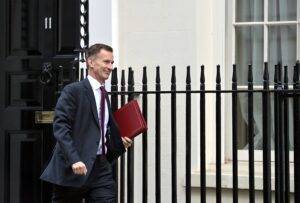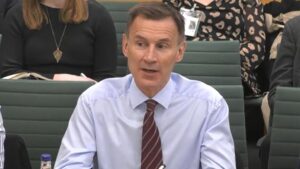UK recession appears to be over as economy expands in January

<?xml encoding=”utf-8″ ?????????>
The UK economy is showing signs of emerging from recession, with new official figures indicating a 0.2 per cent growth in gross domestic product (GDP) in January.
According to the Office for National Statistics (ONS), the economy rebounded at the start of the year, driven by increased activity in the services and construction sectors. The growth figure of 0.2 per cent met expectations set by analysts in the City.
This uptick in GDP suggests that the economy may have swiftly moved away from recession, marking one of the shortest downturns in recent history. Following contractions of 0.1 per cent and 0.3 per cent in the third and final quarters of last year, respectively, the UK met the technical definition of a recession with two consecutive quarters of negative growth. In December, GDP had shrunk by 0.1 per cent.
Jeremy Hunt, the Chancellor, commented, “While the past few years have presented challenges, today’s figures demonstrate progress in economic growth.”
City analysts echoed the Chancellor’s sentiments. Sanjay Raja, senior economist at Deutsche Bank, stated, “The economy is showing signs of a turnaround. The brief technical recession experienced late last year is expected to be short-lived, with growth gradually returning to its normal rate over the course of this year.”
Liz McKeown, Director of Economic Statistics at the ONS, highlighted the positive performance of various sectors in January. “The economy saw growth in retail and wholesaling, along with a notable improvement in construction, particularly in the housebuilding sector,” she said.
However, some sectors experienced declines, including TV and film production, legal services, and the pharmaceutical industry, which can be volatile.
The service sector, a significant contributor to the UK economy, expanded by 0.2 per cent, driven by a robust 3.4 per cent growth in retail trade. This growth coincides with separate data indicating a notable increase in retail sales, the highest since April 2021.
Despite signs of recovery in consumer-facing services, the ONS noted that output levels remain below pre-pandemic levels, underscoring the ongoing impact of the cost of living crisis on household finances.
Meanwhile, the production sector contracted by 0.2 per cent, primarily due to a sharp decline in output from water suppliers. The mining and quarrying sector has also declined by nearly a fifth since January 2022, according to the ONS.
The monthly GDP estimate from the ONS is subject to revisions, with the possibility of the growth figure being adjusted. Last year, the statistics agency revised its GDP data upwards, indicating that the economy was larger by almost 2 per cent compared to pre-Covid levels.
The recent rise in interest rates and inflation has strained households and businesses, resulting in modest economic growth of just 0.1 per cent for the entirety of last year, a historically low rate.
There are expectations that the Bank of England may reduce interest rates for the first time since March 2020 in the coming months, as inflation is projected to fall to the official 2 per cent target from the current 4 per cent. Tuesday’s ONS figures showed a rise in unemployment and a slowdown in wage growth, further bolstering expectations of a rate cut in June from the current 5.25 per cent, a 16-year high.
Governor of the Bank of England, Andrew Bailey, remarked that Britain is nearing full employment despite the significant rise in interest rates, which is uncommon. The Monetary Policy Committee is awaiting more data to confirm a sufficient cooling of the labor market before considering monetary policy adjustments.
In his recent budget announcement, Chancellor Hunt reduced national insurance by an additional 2 percentage points, echoing a move made in the autumn statement last November. These measures, alongside others announced, are expected to boost growth by 0.2 percentage points over the next five years, according to the Office for Budget Responsibility (OBR).
The Chancellor emphasized the need to incentivize work, stating, “If we aim for an increase in growth rates, it’s imperative to ensure that work is financially rewarding, which entails eliminating the unfairness of taxing work twice.”
The OBR has also revised its growth forecast for the UK economy this year to 0.8 per cent, up from 0.7 per cent, and anticipates inflation to decrease to 2 per cent in the coming months.
While the economy shows signs of recovery, the future outlook for GDP growth in the UK remains somewhat subdued, posing challenges for Chancellor Hunt and Rishi Sunak ahead of the anticipated autumn election. The ONS reported a slight contraction in the economy over the three months to January, with the OBR projecting that living standards will not return to pre-pandemic levels until 2025.
Yael Selfin, Chief Economist at KPMG UK, commented, “Despite some improvement in economic performance, the outlook remains relatively bleak. Economic growth is not expected to significantly pick up this year, with demand continuing to be impacted by the lasting effects of high interest rates.”




